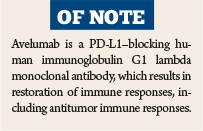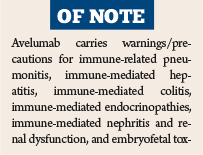In the Clinic provides overviews of novel oncology agents, addressing indications, mechanisms, administration recommendations, safety profiles, and other essential information needed for the appropriate clinical use of these drugs.
On March 23, 2017, avelumab (Bavencio) was granted accelerated approval for treatment of patients aged ≥ 12 years with metastatic Merkel cell carcinoma. Avelumab is the first U.S. Food and Drug Administration–approved product to treat this disease.1,2
Supporting Efficacy Data
Approval was based on the finding of clinically meaningful and durable responses in an open-label, single-arm, multicenter trial (JAVELIN Merkel 200 trial) in which 88 patients received avelumab at 10 mg/kg via intravenous infusion over 60 minutes every 2 weeks until disease progression or unacceptable toxicity.3 All patients had metastatic Merkel cell carcinoma with disease progression on or after chemotherapy for metastatic disease.

Patients had a median age of 73 years (range = 33–88 years, 75% ≥ 65 years), 74% were male, 92% were white, all had an Eastern Cooperative Oncology Group performance status of 0 or 1, 35% had at least two prior treatments for metastatic disease, 53% had visceral metastases, 66% were programmed cell death ligand 1 (PD-L1)–positive (≥ 1% of tumor cells; 16% nonevaluable) on an investigational immunohistochemistry assay, and 52% of 77 evaluable patients tested positive for Merkel cell polyomavirus on an investigational assay.
The overall response rate on independent review committee assessment was 33% (95% confidence interval [CI] = 23.3%–43.8%), with complete response observed in 10 patients (11%). Among the 29 responders, the duration of response ranged from 2.8 to 23.3+ months, with 86% of responses lasting ≥ 6 months and 45% lasting ≥ 12 months. Responses were observed irrespective of PD-L1 tumor cell expression or presence of Merkel cell polyomavirus.
How It Works
Avelumab is a PD-L1–blocking human immunoglobulin G1 lambda monoclonal antibody. PD-L1 expressed on tumor cells and tumor-infiltrating immune cells can contribute to inhibition of antitumor immune response in the tumor microenvironment. Binding of PD-L1 to the programmed cell death protein 1 (PD-1) and B7.1 receptors found on T cells and antigen-presenting cells suppresses cytotoxic T-cell activity, T-cell proliferation, and cytokine production. By binding PD-L1, avelumab blocks the interaction between PD-L1 and its receptors; this interaction releases the inhibitory effects of PD-L1 on the immune response, resulting in restoration of immune responses, including antitumor immune responses. Avelumab has also been shown to induce antibody-dependent cell-mediated cytotoxicity in vitro and decreased tumor growth via PD-L1 inhibition in syngeneic mouse models.
How It Is Used
The recommended dose of avelumab is 10 mg/kg via intravenous infusion over 60 minutes every 2 weeks until disease progression or unacceptable toxicity. Patients should be premedicated with an antihistamine and acetaminophen prior to the first four infusions; premedication should be administered for subsequent doses based on clinical judgment and the presence/severity of prior infusion reactions.
First Agent Approved for Merkel Cell Carcinoma
- Avelumab (Bavencio) was granted accelerated approval for treatment of patients aged ≥ 12 years with metastatic Merkel cell carcinoma. It is the first U.S. Food and Drug Administration–approved product to treat this disease.
- The recommended dose of avelumab is 10 mg/kg via intravenous infusion over 60 minutes every 2 weeks until disease progression or unacceptable toxicity.
The most common serious adverse reactions to avelumab are immune-mediated adverse reactions (pneumonitis, colitis, hepatitis, adrenal insufficiency, hypo- and hyperthyroidism, diabetes, and nephritis) and life-threatening infusion-related reactions. Guidelines for corticosteroid treatment for immune-mediated adverse reactions are specified in the labeling.
Dose modifications for immune-mediated adverse reactions include withholding treatment and its subsequent resumption in patients with complete or partial resolution (grade 0–1) after corticosteroid treatment and taper for the following events: grade 2 pneumonitis; aspartate transaminase (AST) or alanine transaminase (ALT) elevation to > 3 up to 5 times the upper limit of normal (ULN) or total bilirubin > 1.5 and up to 3 times ULN; grade 2 or 3 diarrhea or colitis; grade 3 or 4 endocrinopathies; serum creatinine > 1.5 and up to 6 times ULN; and moderate or severe clinical signs or symptoms of other immune-mediated adverse reactions. For grade 1 or 2 infusion-related reactions, infusion should be interrupted or the infusion rate slowed.
Treatment should be permanently discontinued for the following events: grade 3 or 4 pneumonitis or recurrent grade 2 pneumonitis; AST or ALT elevation > 5 times ULN or total bilirubin > 3 times ULN; grade 4 or recurrent grade 3 diarrhea or colitis; serum creatinine > 6 times ULN; life-threatening adverse reactions (excluding endocrinopathies); recurrent severe immune-mediated adverse reactions; requirement of ≥ 10 mg/d of prednisone or equivalent for > 12 weeks; persistent grade 2 or 3 immune-mediated adverse reactions lasting ≥ 12 weeks; and grade 3 or 4 infusion-related reactions.
Safety Profile
Safety data reflected in the warnings/precautions for avelumab treatment are from 1,738 patients receiving 10 mg/kg every 2 weeks in a single-arm, multicenter, dose-finding, and activity-estimating study (n = 1,650) with 16 disease-specific cohorts and in the single-arm, multicenter study (N = 88)in patients with metastatic Merkel cell carcinoma. The most common serious adverse reactions to avelumab are immune-mediated adverse reactions, including pneumonitis, colitis, hepatitis, adrenal insufficiency, hypo- and hyperthyroidism, diabetes, and nephritis, and life-threatening infusion-related reactions.

In the study in metastatic Merkel cell carcinoma, the most common adverse events of any grade were fatigue (50%), musculoskeletal pain (32%), diarrhea (23%), nausea (22%), infusion-related reaction (22%), rash (22%), decreased appetite (20%), and peripheral edema (20%). The most common grade ≥ 3 adverse events were hypertension (6%), fatigue, musculoskeletal pain, abdominal pain, and decreased appetite (2% each). The most common grade 3 or 4 laboratory abnormalities were lymphopenia (19%), anemia (9%), hyperglycemia (7%), and increased ALT (5%).
Adverse events led to treatment interruption in 24% of patients (not including interruption of infusion for infusion-related reactions when infusion was resumed on the same day) and to permanent treatment discontinuation in 7%. Adverse events leading to discontinuation of treatment were ileus, grade 3 transaminitis, grade 3 creatine kinase elevation, tubule-interstitial nephritis, and grade 3 pericardial effusion. The most common adverse reaction requiring dose interruption was anemia. Serious adverse reactions occurring in at least one patient were acute kidney injury, anemia, abdominal pain, ileus, asthenia, and cellulitis.
Avelumab carries warnings/precautions for immune-related pneumonitis, immune-mediated hepatitis, immune-mediated colitis, immune-mediated endocrinopathies, immune-mediated nephritis and renal dysfunction, infusion-related reactions, and embryofetal toxicity. ■
References
1. U.S. Food and Drug Administration: Avelumab (Bavencio). Available at https://www.fda.gov/Drugs/InformationOnDrugs/ApprovedDrugs/ucm547965.htm. Accessed April 20, 2017.
2. Bavencio (avelumab) injection prescribing information, EMD Serono, Inc, March 2017. Available at http://www.accessdata.fda.gov/drugsatfda_docs/label/2017/761049s000lbl.pdf. accessed April 20, 2017.
3. Kaufman HL, Russell J, Hamid O, et al: Avelumab in patients with chemotherapy-refractory metastatic Merkel cell carcinoma. Lancet Oncol 17:1374-1385, 2016.

